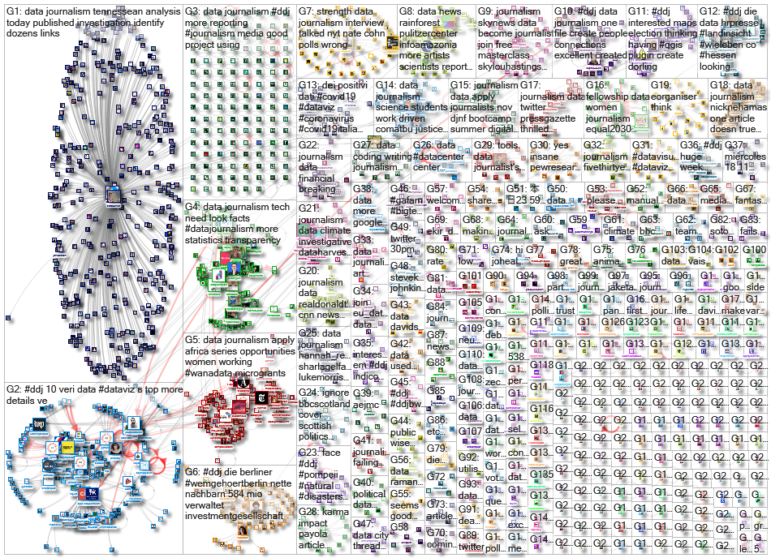Ever noticed how your Google search results now appear with boxes of information extracted from the websites? Our NodeXL #ddj mapping from November 9 to 15 found The Markup’s new “Simple Search” browser extension, which allows you to view the best results in the “traditional” Google search format. We also discovered a visualization of ties between members of the ruling British Conservative Party and COVID-19 contracts, InfoAmazonia’s investigation into mining requests on protected Indigenous land in the Amazon, and German daily Der Tagesspiegel showing how US private equity firm Blackstone is a major private property owner in the German capital.
Simple Search
Tired of all the Google-packaged content at the top of your Google search results? The Markup, a nonprofit investigative newsroom focused on the tech industry, created a browser extension called “Simple Search” that only shows you the search results most relevant to the terms you input. The team decided to build this tool after its July investigation showed that Google products took up 41% of the first page of Google search results.
My @themarkup colleagues @tenuous and @SamMorrisDesign have built a very cool and free tool to let you travel back in time, to a time before Google ate up your whole search page with "suggested" sites, ads, and info boxes…behold, Simple Search! https://t.co/5UhNW4SlD5
— Lauren Kirchner (@lkirchner) November 11, 2020
Cronyism and COVID-19 Contracts
Sophie Hill, a political science PhD student at Harvard University, visualized the connections between politicians from the British Conservative Party — known as the Tories — and companies being awarded UK government contracts during the COVID-19 pandemic. Her visualization is based on data from reporting by various news organizations, including the Guardian, openDemocracy, and Byline Times. Read more in this tweet thread and find the data and code on Github here.
This is so GREAT! @sophie_e_hill has built 'My Little Crony' – an interactive visualization of the connections between Tory politicians & companies being awarded govt contracts
cc @BylineTimes @openDemocracy @allthecitizens @GoodLawProject pic.twitter.com/NLNuyc12kd
— Carole Cadwalladr (@carolecadwalla) November 10, 2020
Amazon Mining Requests
Mining activity in Indigenous lands in the Amazon is prohibited under Brazil’s constitution. But this hasn’t stopped interested companies from submitting dozens of mining requests each year. InfoAmazonia discovered that the country’s National Mining Agency keeps active more than 3,000 such requests, even though in theory it should reject these applications immediately.
EXCLUSIVE investigation by @amazonia_minada reveals Brazil’s mining regulator is actively entertaining more than 3,000 requests to mine on Indigenous lands in the Amazon, which is prohibited under the country’s Constitution.https://t.co/jaGrREgyLB
— InfoAmazonia (@InfoAmazonia) November 13, 2020
Coronavirus Clusters in Nashville
Nashville, Tennessee, is famed as the home of country music. It’s also a coronavirus hot spot these days. The first seven months of the outbreak there saw tens of thousands of people infected, with nearly 70 infection clusters. By analyzing anonymized contact tracing data, Brett Kelman, health care reporter for The Tennessean, managed to identify dozens of links between multiple separate COVID-19 infection clusters.
Today, The @Tennessean published an investigation in which I identify dozens of links between known coronavirus clusters in Nashville through an analysis of contact tracing data. This is my most complex journalism of 2020. And this is a thread. 1/ https://t.co/ylWvGXrFSO
— Brett Kelman (@BrettKelman) November 12, 2020
Mapping Natural Disasters
The catastrophic eruption of Mount Vesuvius in the year 79 AD, which famously obliterated the Roman city of Pompeii, was one of the deadliest in European history. Data visualization designer Mohamad Waked worked up the history of the Vesuvius disaster and more recent natural disasters over the past 120 years. The visualization details how since 1900, a total of 15,612 natural disasters have occurred worldwide, causing the deaths of millions of people.
New #datastory : “#POMPEII | THE ANGRY FACE OF NATURE”.
It tells about the other face of #NATURE, giving the eruption of #VESUVIUS 🌋 as a historical example, and showing history of the most violent #natural #disasters, since 1900.https://t.co/aDpcP2oUVp#dataviz #ddj #COVID pic.twitter.com/O1RTAFRBTd
— Mohamad Waked (@mohamad_waked) November 8, 2020
Blackstone: Berlin Landlord
The German real estate market can be opaque. But here’s an intriguing look inside, by political economist Christoph Trautvetter (made available to German daily Der Tagesspiegel). Trautvetter’s study indicates that US private equity firm Blackstone not only owns numerous office buildings in the capital Berlin but also thousands of apartments in the city. Blackstone’s ownership of at least 3,500 apartments in Berlin makes it one of the city’s major private property owners.
According to @Tagesspiegel's new research, financial investor @blackstone owns more than 3.500 apartments in Berlin. https://t.co/BWBoCxhCui#housing #berlin #germany #financialisation #biglandlords
— Arena Housing Project (@ArenaHousing) November 10, 2020
Africa: Fellowships for Female Data Journalists
WanaData, a network of African women journalists, data scientists, and technologists, is launching a series of micro grants and new data fellowships with several partners. Opportunities include fellowships and workshops in the fields of deforestation, human trafficking, gender data, and water security. Details here.
New opportunities❗
The #WanaData community is launching a series of microgrants and fellowships for women working in data, technology and journalism in Africa.
Here are some of the programmes you can apply for: https://t.co/vzSbxy04ts
— Code For Africa (@Code4Africa) November 12, 2020
COVID-19 in Russian Prisons
Prisons are the “ideal” place for the spread of the coronavirus due to overcrowding, weakened immune systems among detainees, and low availability of medical staff and equipment. The Women in Prison project, led by veteran human rights activist Leonid Agafonov, examined a range of problems in Russian prisons during the pandemic, including tougher regulations affecting human rights and questionable data on infection rates. GIJN previously profiled the award-winning project here.
#ФСИН борется с распространением #COVID19, ужесточая изоляцию заключенных. И без того закрытая система стала менее прозрачной, а заключённые – ещё больше ограничены в правах.
«Тюремный #COVID»#ddj-проект с @zzzonaprava @hetero_for_lgbt @nhc_no
Рус👉https://t.co/vyfErL4fL1 pic.twitter.com/sxs4qedLsH— GIJN in Russian (@gijnRu) November 11, 2020
News Impact Summit
How can journalists combine data analysis with traditional reporting? How can data journalism counter misinformation? How can we lobby for better access to data? The November 24 to 26 News Impact Summit is free and will focus on data journalism. Speakers will share the latest technology tools and resources to help journalists advance their data skills.
We're happy to share the programme for our #NISData online event on innovation in #datajournalism!
👉 24-26 Nov, free-of-charge
👉 the latest tech, tools & resources
👉 timely topics, incl covering #COVID19 & #elections2020
👉 workshops in 🇬🇧 🇫🇷 🇩🇪https://t.co/ay8YdEfzol— European Journalism Centre (@ejcnet) November 10, 2020
Data Podcast
In a recent Conversations with Data podcast, Datajournalism.com’s Tara Kelly spoke with economist and journalist Tim Harford about his new book, “How to Make the World Add Up,” the power of statistics, and his advice for data journalists.
What's the role of statistics in #journalism? Award-winning journalist and best-selling author @TimHarford spoke to us about his new book and the importance of using #data to make sense of key-events such as #COVID19 https://t.co/xkhG6qtd6v #datajournalism #podcast pic.twitter.com/ZhYSO1lUmS
— DataJournalism.com (@datajournalism) November 11, 2020
Thanks again to Marc Smith and Harald Meier of Connected Action for gathering the links and graphing them. The Top Ten #ddj list is curated weekly.
 Eunice Au is GIJN’s program manager. Previously, she was a Malaysia correspondent for Singapore’s The Straits Times, and a journalist at the New Straits Times. She has also written for The Sun, Malaysian Today, and Madam Chair.
Eunice Au is GIJN’s program manager. Previously, she was a Malaysia correspondent for Singapore’s The Straits Times, and a journalist at the New Straits Times. She has also written for The Sun, Malaysian Today, and Madam Chair.

